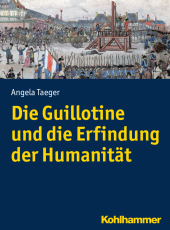 Neuerscheinungen 2016Stand: 2020-02-01 |
Schnellsuche
ISBN/Stichwort/Autor
|
Herderstraße 10
10625 Berlin
Tel.: 030 315 714 16
Fax 030 315 714 14
info@buchspektrum.de |

Angela Taeger
Die Guillotine und die Erfindung der Humanität
2016. 143 S. 11 Abb. 210 mm
Verlag/Jahr: KOHLHAMMER 2016
ISBN: 3-17-029278-1 (3170292781)
Neue ISBN: 978-3-17-029278-9 (9783170292789)
Preis und Lieferzeit: Bitte klicken
1791 wird in Frankreich beschlossen, die Todesstrafe beizubehalten; allerdings wird verlangt, sie zu humanisieren. Mit der Guillotine steht ab 1792 ein Gerät bereit, das dieser Anforderung Genüge tun sollte. Erst 1977 kommt die Guillotine zum letzten Mal zum Einsatz. Was veranlasst Joseph-Ignace Guillotin 1789, sich als Sachkundiger in der Frage staatlich veranlassten humanen Tötens zu profilieren? Welche Bedeutung kommt der Guillotine als Requisit auf der Bühne macht- und herrschaftspolitischer Zwistigkeiten ab 1791 bis zur Beseitigung der Todesstrafe 1981 zu? Und welche Rolle spielt das Publikum bei der Debatte um die Todesstrafe und deren Vollzug? Das Buch liefert dazu Erklärungen sowie ein Panorama der Kulturgeschichte der Todesstrafe in Frankreich.
In 1791, the decision was taken in France to keep the death penalty in force & but there was a demand for it to be made more humane. From 1792 onwards, the guillotine provided an apparatus that was intended to satisfy this requirement. The guillotine was used for the last time only as late as 1977. What led Joseph-Ignace Guillotin in 1789 to make a name for himself as an expert on the issue of state-ordained humane killing? What was the importance of the guillotine as a prop on the stage of political conflicts and power disputes from 1791 until the abolition of the death penalty in France in 1981? And what role did the public play in the debate over the death penalty and how it was to be carried out? This book provides answers and presents a panorama of the cultural history of the death penalty in France.
Dr. Angela Taeger ist apl. Professorin für Neuere Geschichte an der Universität Oldenburg.


